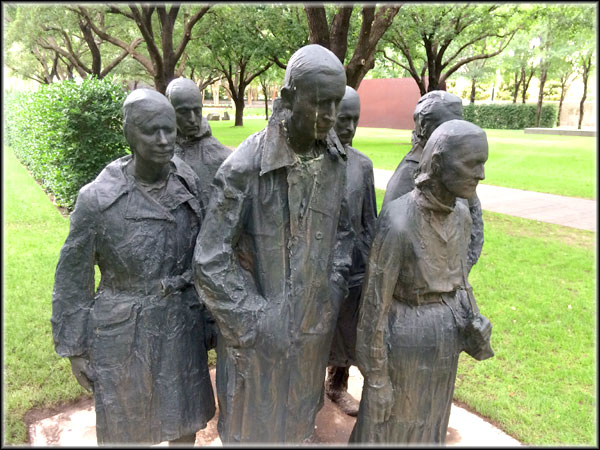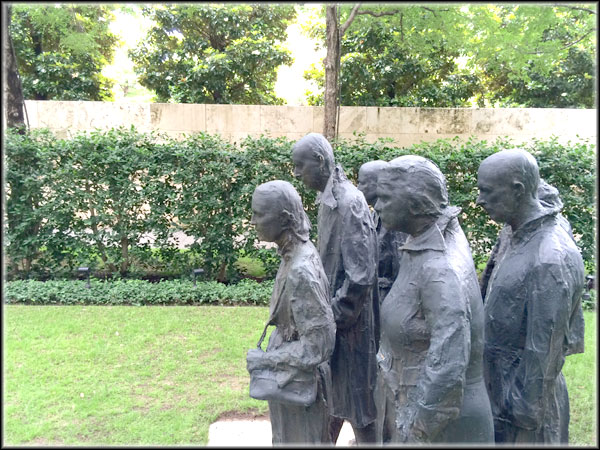Knowing Better
11.29.15

'I cannot understand how you could make such an ignorant, offensive statement. It goes against everything I know to be fair and just and right in the world…
'Do you really believe that? Go ahead, try to defend your totally indefensible position. Stand behind it and answer to the consequences, or else admit that you're wrong… that you just don't know any better.
'Pick your side. Are you with us, or against us? You can't have it both ways. And if you choose wrong, I don't think we can be friends anymore.'
Under such inquisitional duress, who would be able to thoroughly explain their viewpoint to someone who doesn't immediately agree? Who would be brave and frank enough to admit their limited knowledge, their conflicted feelings? Who'd patiently try to lay out the nuances of their intricate opinion, finer greys which get painted over by the crude insistence on 'black' or 'white'? And who would feel safe to share the personal history of lived experiences which undergirds their beliefs? Why bother? To have their life-story be disregarded, disrespected, debased into fodder for illustrating someone else's point?
It's one thing—an admirable one at that—to strongly hold a principled stance about a cherished ethic or life-value, but entirely another to use it as justification for dismissing or desecrating another person's humanity. How quickly, once we have concluded we're positioned on the correct side of justice, we cease to treat those who disagree as if they are worthy of just treatment. I will not catalogue the countless examples, even from just the past few weeks' news, of those who claim their ground as moral truth ('The Word') resorting to harassment, violence, or murder to demonstrate their superiority. By these tactics, we win the war of beliefs atop the broken hearts and bloodied bodies of fathers and mothers, grandmas and grandpas, brothers and sisters, sons and daughters. Who could posit their belief is more precious than someone else's life?
Though it's easy to wag our finger at the most extreme instances, only the most gentle and even-tempered among us are not guilty of some version of allowing ideology—whether religious, political, economic, or behavioral—to harden our hearts. We cannot imagine who would be so clueless, cold, corrupt, or cruel to support that evil-doing figure, organization, or movement. But the very reason we cannot imagine what motivates such 'othered' individuals is because we refuse to get to know them as people, since we already consider their endorsement of 'this' or 'that' as irrefutable evidence of their shameful nature. Instead, we demand they reverse their viewpoint, criticize them for their obvious lack of intelligence, hurl insults or obscenities, and/or essentially discount them as deserving any of our care.
Sometimes, though, those who utter the ignorant or offensive statement are people we know and love. And if we honor our relationships enough so there's room for the complexity of simultaneous disagreement and care, we don't have the luxury of hastily cutting someone off based solely on an ideological disconnect. Though we might be clear about the wrongness of their stance on this issue, we may also be upset, shocked, and/or disheartened by the fact it came from this person… an individual who we share history with, whose heart we thought we knew, who we trusted as somebody 'good'.
But then, as we watch our like-minded 'allies' mercilessly attack this person-we-know-and-love for their stance (one which, perhaps, was poorly thought out or clumsily phrased, lacks supporting information or compassion, and/or is still being actively worked through), we suffer a double upset: Not only has someone we know and love offended us, but our 'allies' have aggressively impugned their character, used threatening language to 'put them in their place', and implicitly or unequivocally labeled them as 'bad'.
Oh, how it hurts to watch those on my 'side' lash out at someone's out-of-touch grandparent or iconoclastic aunt for being an idiot, an asshole, an advocate for evil. And oh, how I'm ashamed for having been guilty of perpetrating such lashings myself… and how I continue to be at risk for one more ruthless ranting-and-raving, at every moment my driving agenda blinds me to another's humanity.
 'If only everyone else knew you like I know you… I know you mean no harm… having known you for so long, I understand why you believe what you do…'
'If only everyone else knew you like I know you… I know you mean no harm… having known you for so long, I understand why you believe what you do…'
Sometimes it's us who ignore or offend, unwittingly or in a heated moment. Should we heed that tugging at our conscience which points us toward reconsideration or regret, we can only hope to inspire grace in the hearts of those who seemingly know better than we do. Otherwise, the cycle of hard-line ideological barbarity continues undisrupted.
Who hasn't faced the dilemma of a peer, friend, or loved one holding an opinion we'd consider closed-minded, prejudicial, or repugnant? Do we cease to care about them? Do we care more about being right, or being in relationship with this person? It's a complicated choice. What happens if we quit being in relationship with everyone who doesn't agree we're right?
Of course, societal reality is such that we cannot quit being in relationship with folks who believe differently, for they are just as much a part of the collective populace as we are… though the inflated influence of social media increasingly obscures this reality, worsening the apparent divide between 'us' and 'them' by making it oh-so-easy to unfollow or unfriend someone who offends us with this or that statement, allowing us to continually affirm our righteousness by curating an echo-chamber chorus of 'reasonable' viewpoints which largely mirror our own. No matter how respectfully two friends with opposing ideas might attempt to discuss their differences in this venue, it's almost inevitable some friend-of-a-friend (or their friend's friend) will chime in with a less-friendly tone, a sanctimonious attitude, maybe a bit of name-calling. Once again, nobody learns anything new, just reconfirmation of how rude and unfeeling people can be, especially to those they don't know.
In one sense, it's obvious that not everybody could (or should) be legitimately considered 'our people'. Certain worldviews are pretty incompatible with others, leaving folks on either far-edge of the chasm-in-between wondering what they could possibly share in common. Besides, life is too short to invest precious time and energy on those already antagonistic or hostile toward the identities and ideals which define who we are, particularly if they show no signs of openness to evolving. Yet, in another sense, we all belong to a singular humanity… and, if we harbor any unifying spiritual or moral belief, are consequently charged with upholding one another's safety and dignity, a responsibility which we're not absolved of just because we may think we 'know better' than someone else about a certain topic, then extrapolate too far into ultimately dehumanizing conclusions about 'them'.
The thoughts I'm expressing here were cohering in my mind as Mercury moved to conjoin Saturn in Sagittarius (exact this past Tuesday Nov 24), accentuating Saturn's ongoing square with Neptune in Pisces. Mercury in Sagittarius can be brash, blunt, and quite single-minded in how it conveys the often-black-and-white conclusions it draws. Its Saturn conjunction warns us of the need for communicative discretion, moderation, and restraint if we wish to avoid negative repercussions from what we say.
In my previous essay about the Saturn-Neptune square, I focused more on Saturn-in-Sagittarius's call to cut through any overly idealistic Neptune-in-Pisces tendencies with whatever simplifying (though potentially disenchanting) judgment-calls are essential to our moving forward in our lives. Consider this, then, my counterbalancing ode to Neptune's voice in this square: If left unchecked, our monolithic and/or too-hasty judgments cut us off from our compassion for others (and ourselves), a dangerous first-step which too quickly leads us to excuse subsequent acts of disrespect, heartlessness, cruelty, or violence, all in the name of some laughably 'moral' crusade.
To really 'know better' is to know how very few people expand their perspectives or evolve in understanding through being browbeaten, publicly shamed, or insulted by someone who's haughtily convinced they possess the 'fuller' view. Even if you are more knowledgeable than another person in certain relevant areas, the contemptuous lording-over of this knowledge is likelier to spur defensive resistance than foster sincere inquiry.
To 'know better' is to have sufficient faith in the appeal of your beliefs that you present them calmly and clearly, allowing the ideas to soar or sink on their own merit, not because you raised your voice or sneered at the alternatives someone else offered. If you're ever to successfully change anyone's mind, it'll only be after your heart was open to knowing them as individuals… and once, thanks to that, they knew they could trust you to respect them, regardless of your divergent experiences and worldviews.
To 'know better' is to know better than assuming any viewpoint is justification enough for forgetting someone else's humanity, no matter how well-informed or virtuous you think you are.



